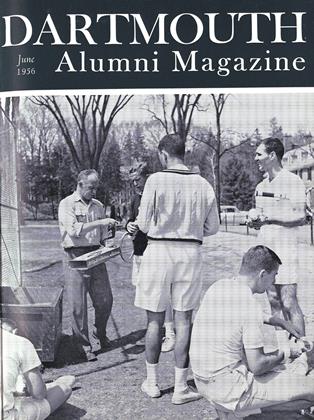ByJoseph Cornwall Palamountain Jr. '42.Cambridge: Harvard University Press, 1955. 270 pp. $4.73.
This is a book for businessmen as well as professional scholars. It tells of conflict between small and large distributors of drugs, groceries, and automobiles. In examining this conflict the author exposes some limitations of traditional economic and political theory.
A key distinction is made between three kinds of competition. The first is between similar firms such as retail grocers. A second is between different types of firms, for example retail druggists against large chain stores, mail-order houses, or supermarkets. A third is between firms at different levels, for example automobile dealers against their automobile manufacturers.
The second and third forms may be accompanied by power relationships quite as important as the market relationships identified by economists. The parties sense a common foe. If possible they organize. They may bargain or try to transform economic power into political power. The druggist effectively resists pressure from manufacturer and consumer alike. Using the "loss leader" argument as a smokescreen, his trade association secures "fair trade" laws that help maintain his formidable markup.
The author's conclusions are important in terms of both social policy and social science. In general large distributors have not abused their power. Their more dynamic competition can lead to lower prices or to "explosively creative improvements in product or service."
At the level of theory the author feels one must modify the view, often attributed to Arthur Bentley, that public policy is virtually a mathematical product of the strength of rival groups. A related observation is that "Politics is both more and less than a simple reflection of economics; it reflects economic situations imperfectly, and it reflects many non-economic forces."
In documenting this latter point Professor Palamountain makes a welcome addition to political economy. Reinvigoration of this once great science was stimulated a few years ago by Dahl and Lindbloom's Politics, Economics,and Welfare. This careful study is another long step toward its revival.
 View Full Issue
View Full Issue
More From This Issue
-
 Feature
FeatureThe Reynold Scholars
June 1956 By PROF. JOHN HURD '21 -
 Feature
FeatureLEARN AMERICAN
June 1956 By EDWARD C. KIRKLAND '16 -
 Feature
FeatureA NEW CONCEPT of Dormitory Living
June 1956 -
 Feature
FeatureTHE NICHOLS ERA
June 1956 -
 Class Notes
Class Notes1918
June 1956 By ERNEST H. EARLEY, RICHARD A. HOLTON -
 Class Notes
Class Notes1926
June 1956 By HERBERT H. HARWOOD, ANDREW J. O'CONNOR
LAURENCE I. RADWAY
-
 Feature
FeatureHow Much Government?
March 1954 By LAURENCE I. RADWAY -
 Books
BooksFREEDOM OF SPEECH BY RADIO AND TELEVISION.
APRIL 1959 By LAURENCE I. RADWAY -
 Books
BooksMAN INCORPORATE, THE INDIVIDUAL AND HIS WORK IN AN ORGANIZED SOCIETY.
November 1968 By LAURENCE I. RADWAY -
 Feature
FeatureCITIZEN SOLDIERS
October 1973 By LAURENCE I. RADWAY -
 Books
BooksNot in the Stars
January 1976 By LAURENCE I. RADWAY -
 Books
BooksThe New Right
November 1979 By Laurence I. Radway
Books
-
 Books
BooksCOLLEGE PHYSICS
July 1960 By ALLEN L. KING -
 Books
BooksTHE PLANS OF MEN
July 1940 By C. N. Allen '24, Harold G. Rugg -
 Books
BooksEURIPIDES: IPHIGENEIA IN TAURIS.
February 1975 By KATHERINE LEVER -
 Books
BooksCOLLECTIVE BARGAINING FOR PUBLIC EMPLOYEES.
MAY 1970 By ROBERT M. MACDONALD -
 Books
BooksJOBS TO TAKE YOU PLACES — HERE AND ABROAD.
MARCH 1969 By SUSAN A. LIDDICOAT -
 Books
BooksTHE QUEST FOR CERTAINTY
MARCH 1930 By William Kelley Wright


